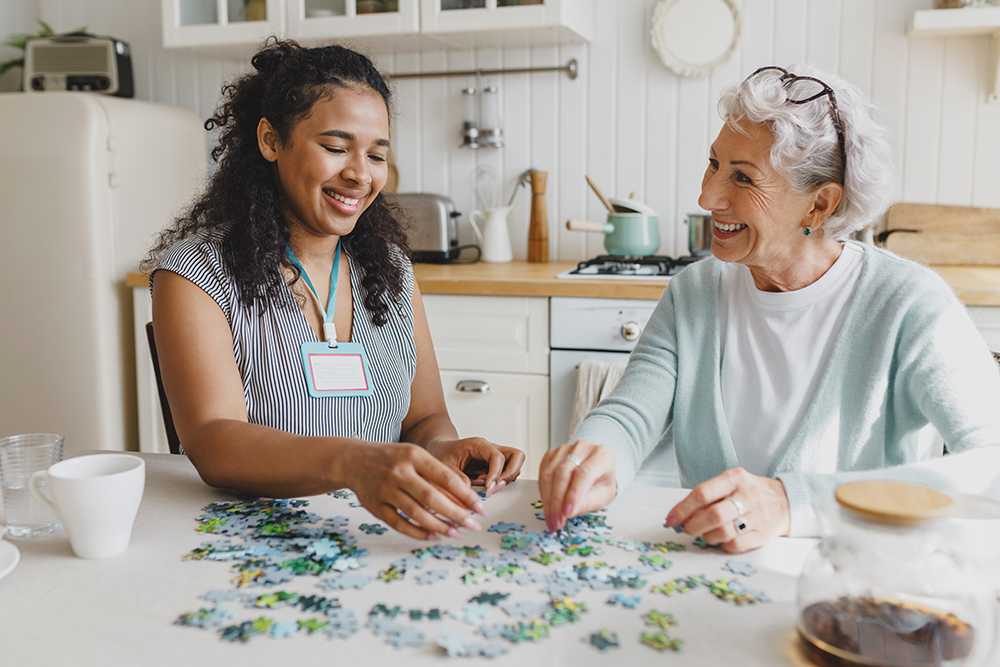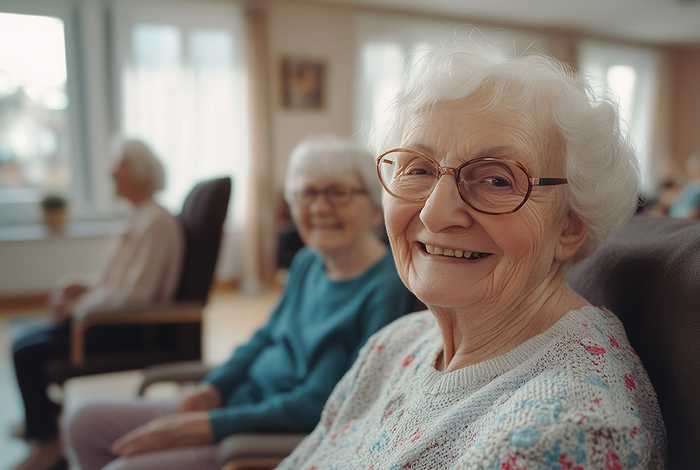Posted by Janine Griffiths
Top 10 duties and responsibilities of a care worker

Care workers play a vital role in supporting individuals who need assistance with daily living, from elderly clients to those with disabilities or health challenges.
These professionals provide essential care that enhances the wellbeing, dignity, and quality of life of those they serve.
Far beyond simply meeting basic needs, the duties and responsibilities of a care worker encompass a range of tasks designed to support clients physically, emotionally, and socially.
In this post, we’ll explore the top 10 duties and responsibilities of a care worker, highlighting the skills and dedication required for this rewarding role.
Key skills and qualifications to look for in a care worker
When evaluating the duties and responsibilities of a care worker, it’s important to consider the specific skills and qualifications you’re after to ensure you get the best support.
Look for a combination of formal training and personal attributes that reflect a commitment to compassionate care. Key qualities include empathy, patience, effective communication, and attention to detail.
These interpersonal attributes are also vital, as they help care workers provide tailored support while maintaining a client’s dignity and wellbeing. Below we’ve listed some of the other skills to look out for when selecting a support worker:
Professional qualifications: Many care roles require certifications such as NVQs in health and social care or equivalent training that covers essential areas like first aid, safeguarding, and personal care.
Empathy and patience: A care worker must be able to connect with clients emotionally, showing understanding and patience in challenging situations.
Communication skills: Effective listening and clear communication help in building trust and ensuring clients' needs are met accurately.
Physical stamina: Care work can be physically demanding, so a good level of fitness and endurance is important.
Attention to detail: Care workers must be vigilant and attentive, especially when monitoring health or administering medication.
Respectful & confidential: A care worker is dedicated to upholding a person’s privacy and dignity in every interaction. They honour confidentiality and provide care with the same respect, compassion, and understanding they would expect for themselves or their own loved ones. This commitment ensures that each individual feels valued, safe, and respected.
The 10 top duties and responsibilities of a care worker
Those who work in the care industry carry out a range of essential tasks to support the wellbeing, safety, and comfort of those in their care. Below are the top 10 key duties and responsibilities of a care worker that clearly define their vital role.
1. Personal care assistance: Care workers assist clients with essential personal hygiene tasks, including bathing, grooming, and dressing, to support both health and comfort. This requires sensitivity and a commitment to respecting each person’s privacy and dignity, ensuring they feel valued and secure throughout these personal routines.
2. Medication management: Administering and monitoring medication as prescribed is a vital care worker responsibility, as accuracy is essential to client health and safety. Care workers must closely follow instructions and communicate with healthcare providers to ensure proper dosages and timely reminders, reducing the risk of errors.
3. Mobility support: Helping seniors to move safely, whether transferring from bed to the wheelchair or assisting with short walks, is key to preventing injury and promoting independence. Care workers ensure clients feel secure during movement, supporting their physical needs while minimising fall risks and enhancing mobility.
4. Meal preparation and nutrition: Care workers prepare nutritious meals tailored to clients’ dietary preferences and health requirements, helping them maintain balanced nutrition. They monitor eating habits to ensure the wellbeing of their clients, making adjustments when necessary and addressing any potential dietary concerns that may arise.
5. Emotional support and companionship: Providing companionship and emotional support is another one of the lesser-known duties and responsibilities of a care worker. However, from an emotional perspective, it is probably one of the most important in terms of helping to reduce loneliness and promoting mental wellbeing. Care workers offer a caring presence, listening and engaging in meaningful conversation to create a supportive environment, which has a profound positive effect on a client’s overall happiness and emotional health.
6. Monitoring health and reporting changes: Observing clients for any changes in physical or mental health is critical to early intervention and effective care. Care workers document and report any developments to medical professionals or family members, enabling timely adjustments in care plans to address evolving needs.
7. Household support and cleaning: Assistance with light housekeeping tasks, such as tidying, laundry, and basic cleaning, helps maintain a safe, comfortable environment. Care workers ensure clients’ surroundings are clean and organised, which is essential to their overall health, safety, and quality of life.
8. Assisting with appointments and activities: Care workers support clients in attending medical appointments and engaging in social or recreational activities, which promotes a sense of independence. This assistance helps clients stay connected with their community, maintain personal routines, and enhance their overall wellbeing.
9. Advocacy and rights protection: Another aspect of a care worker’s role is to advocate for the rights and needs of seniors under their care. This helps to safeguard their dignity and ensure they receive appropriate care. Care workers are attuned to clients’ rights, supporting their decisions and advocating for fair treatment and respect within the care environment.
10. Documenting care and following protocols: Accurate documentation of daily activities, health observations, and care protocols is essential for quality and consistency. Care workers carefully record details of each care session, enabling clear communication with healthcare teams and ensuring the continuity and reliability of care provided.
Understanding the core values of a care worker
The duties and responsibilities of a care worker extend far beyond basic assistance—they are a lifeline for individuals needing compassionate, respectful, and attentive care. From providing essential personal support to advocating for clients’ rights, care workers bring patience, skill, and dedication to each aspect of their role. Understanding these core duties highlights the value they bring to clients' lives and emphasises the importance of quality, person-centred care in supporting wellbeing and independence.
Looking for a care provider?
If you are looking for a care provider for yourself or a loved one, Autumna can help. Our directory makes it easy to search for options in your preferred area. Simply select the type of care you need and enter your chosen location to see a list of providers that are local to you.
Alternatively, you can answer a few quick questions to be matched with a list of personalised care providers.
Receive a Free Care Provider Shortlist!
Let our expert team of advisers get your search off to a great start.
Tell us a little about your needs and we'll send you a bespoke shortlist of care providers! Click the button below to begin, it takes just a few minutes.
Other articles to read
From the blog

Older Persons Care Advice
Ultimate guide to care homes in Norwich
April 23rd, 2025
Discover the best care homes in Norwich—explore lifestyle-focused options, top-rated services, and how to choose the right home with confidence.

Older Persons Care Advice
How to find an adult day care centre near you
April 22nd, 2025
Looking for an adult day care centre near you? Discover how to find safe, joyful care for your loved one—and support for yourself—on Autumna.

Older Persons Care Advice
How to shortlist care homes in Exeter
April 17th, 2025
Need help shortlisting care homes in Exeter? Learn how to filter options with confidence, compare homes, and find the best fit with Autumna’s free tools.
Frequently Asked Questions
Care workers assist with daily tasks like personal hygiene, meal preparation, medication management, and mobility support. They also provide emotional companionship, household support, and advocate for clients’ wellbeing and rights.
Key skills include empathy, patience, effective communication, and physical stamina. Formal qualifications in first aid, safeguarding, and personal care are also beneficial, along with attention to detail for accurate care delivery.
Emotional support helps reduce loneliness and improves mental wellbeing, which is crucial for overall health. Care workers offer companionship and engage in meaningful conversation to foster a supportive, trusting relationship.
Care workers are trained to assist with mobility, monitor health changes, and ensure safe environments. They handle medications correctly and promptly report any health concerns, creating a secure, proactive care setting.
Look for qualifications such as NVQs in health and social care, along with first aid training. Personal attributes like empathy, respect, and patience are equally vital for high-quality, compassionate care.
Yes, care workers often assist with light housekeeping, including tidying, laundry, and basic cleaning, to maintain a comfortable, safe environment for their clients.
Advocating for clients' rights helps protect their dignity and ensures they receive fair treatment and respect. Care workers support clients' decisions and needs, promoting autonomy and safeguarding their rights.
Focus on both skills and interpersonal qualities, such as empathy, respect, and patience. Qualifications like first aid certification, experience in personal care, and strong communication skills are key indicators of a capable care worker.






